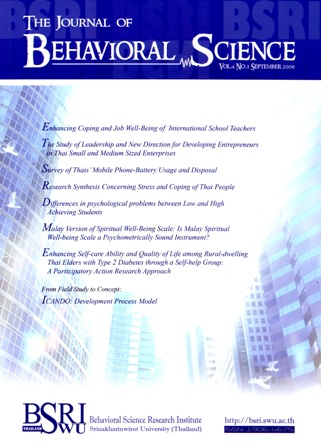Enhancing Self-care Ability and Quality of Life among Rural-dwelling Thai Elders with Type 2 Diabetes through a self-help Group: A Paricipatory Action Research Approach
Main Article Content
Abstract
The purposes of this study were to investigate the impact of self-help group participation on enhancing self-care ability and quality of life, as well as to explore perceptions about experiences of group participation among rural-dwelling Thai elders with type-2 diabetes. Participatory Action Research (PAR) with an integration of both qualitative and quantitative approaches was designed for the study. Critical social theory was used as a guiding framework to emancipate the rural elders with type-2 diabetes from disadvantaged conditions for a better life. Twenty participants were purposively recruited from rural elders with type-2 diabetes living at a rural village of Ayutthaya Province to participate in the self-help group meetings offered twice a month for six months. Quantitative data assessing the participant’s self-efficacy, quality of life, and blood sugar level were analyzed by paired-samples t test. Qualitative data from focus group discussion and observation were analyzed by content analysis. The results revealed that after 6-month group participation, participants reported significantly increased self-efficacy and quality of life while their fasting blood sugar level significantly decreased. In addition, they perceived benefits of group participation in enhancing their self-care ability and quality of life. Culturally-sensitive knowledge and a sense of empowerment that individuals received from the group increased their self-control and power for better managing the disease.
A sense of self-efficacy fostered them to have competition and conforming to others for improved self-care. The recommendation is that the self-help group as a form of mutual aid that could offer great benefits to rural elders with type 2 diabetes should be implemented in community health sectors.
Keywords: Self-care, Quality of Life, Rural Elder, Type 2 Diabetes, Self-help Group

